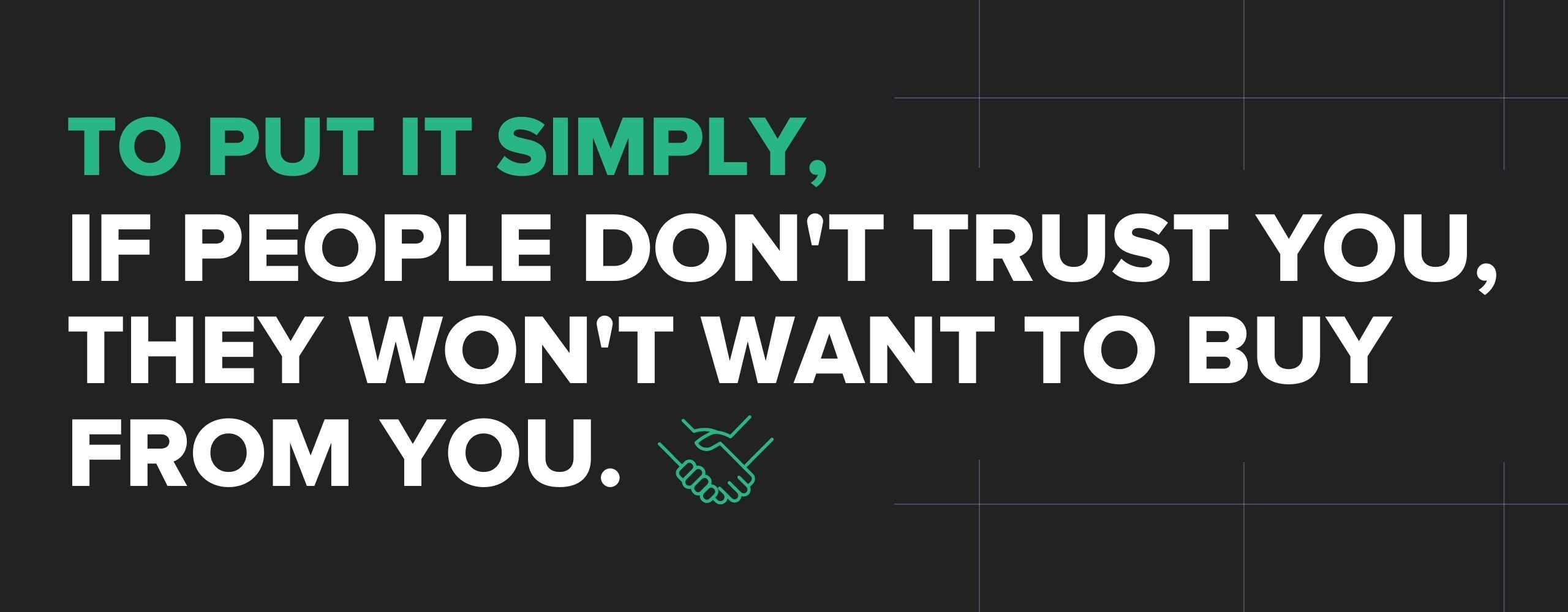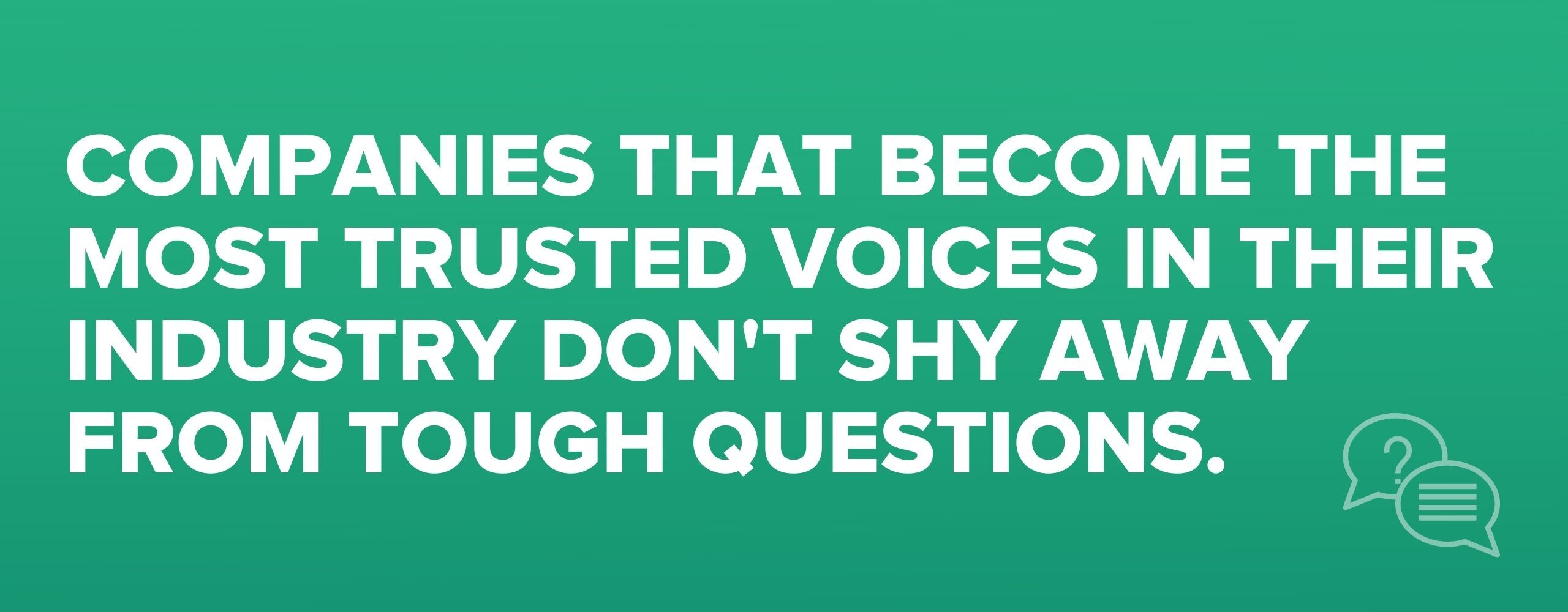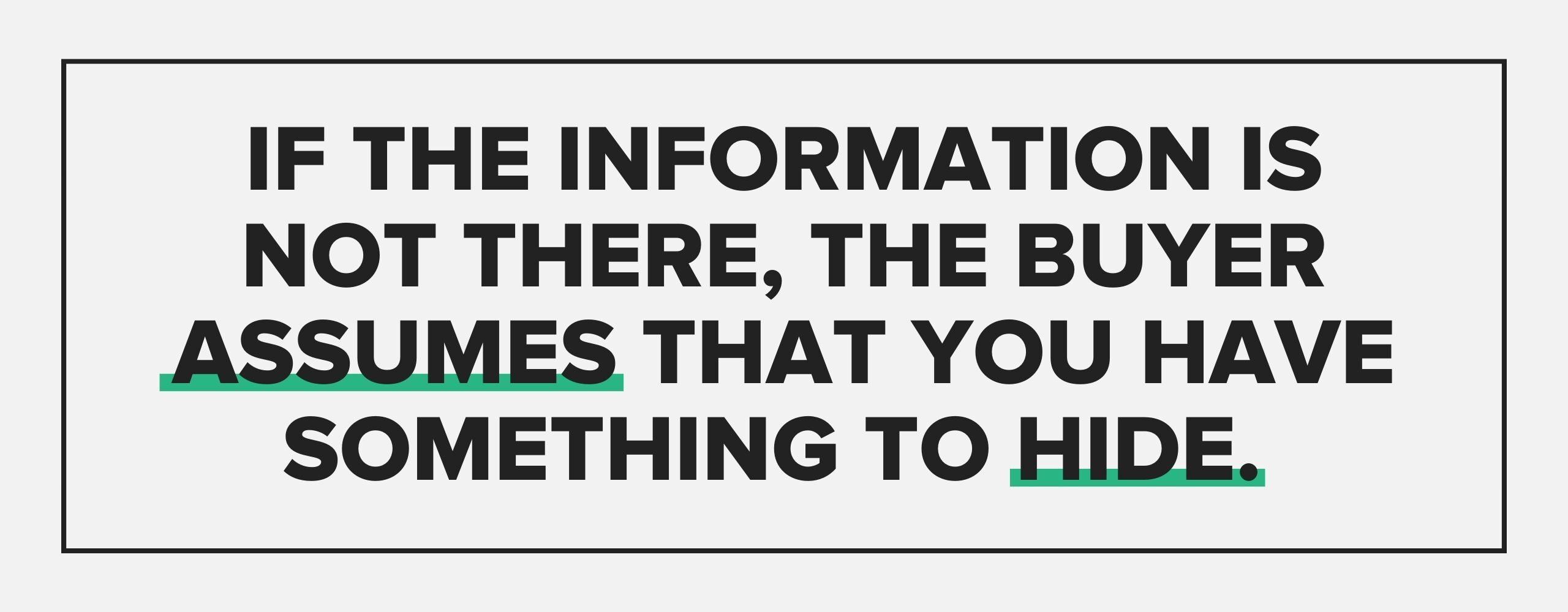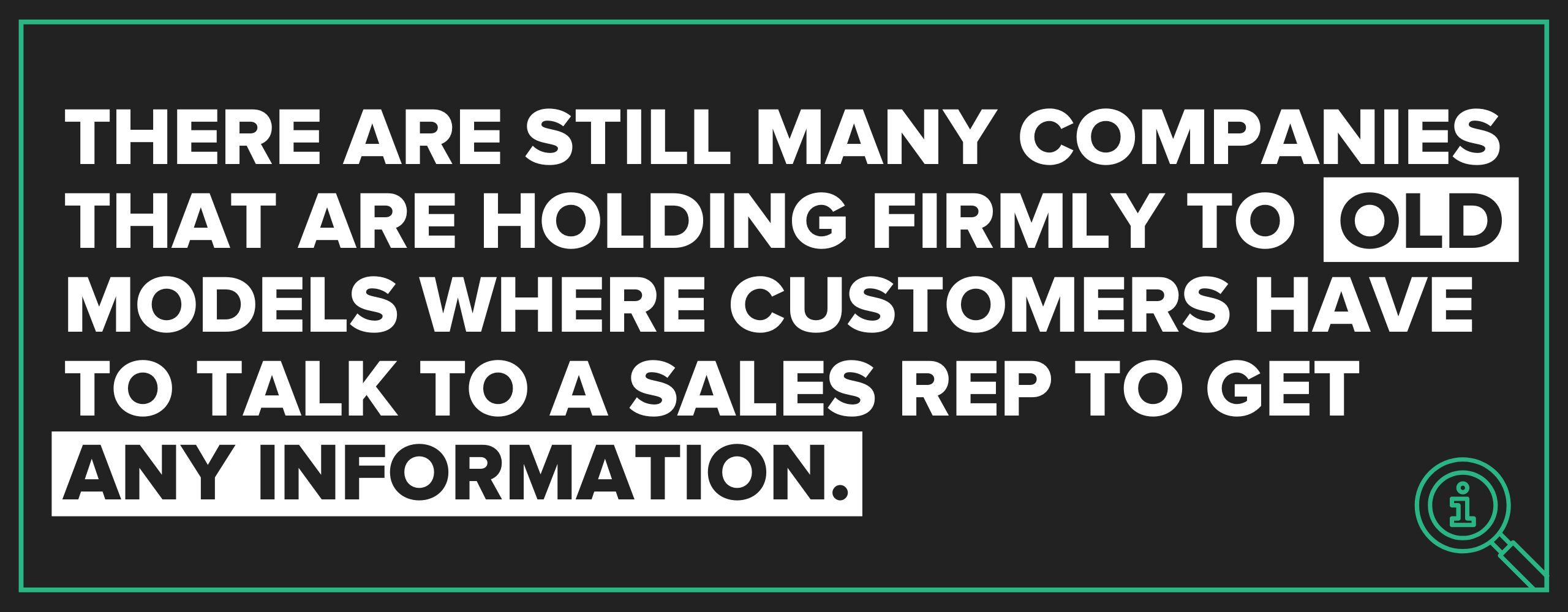Subscribe now and get the latest podcast releases delivered straight to your inbox.
Why Trust Is the True Currency for All Business

Aug 9, 2023

A quick question for all the business owners out there: Will Instagram be a fundamental part of your marketing strategy in 25 years? How about YouTube Shorts?
You don't know, do you?
Of course not. Instagram didn't exist 25 years ago. And with the way things are changing these days, it's hard to know what will happen five years in the future — let alone 25.
OK, a second question: In 25 years, will trust be fundamental to your business success?
Yes, of course it will be.
This, my friends, is an important distinction to make. Platforms, tools, tactics — these things come and go. But principles remain.
Trust is a principle that transcends all industries and markets. In fact, it is the very currency of business, and organizations need to actively work to build, measure, and (when they have to) repair trust.
Why buyers default to distrust
If people don't trust you, they are unlikely to buy from you. It's that simple.
A buyer who doesn't trust you:
- Won’t feel like you have their best interest in mind
- Doubts that you'll deliver on your promises
- Will not believe that you will solve their problems
And here's the real challenge: Buyers default to distrust.
It's nothing your company did. It's not the fault of your salespeople. It might not even be due to a trust deficit in your industry.
Buyers go into any purchase ready to guard themselves. They've heard too many sales pitches. They've been upsold too many times on features they don't need.

Before your buyers have ever met you, they are wary and suspicious, distrustful of what you have to say. Unsure if what they're going to hear is actually in their best interest.
Whenever we lead with honesty, we build trust
When customers find you online, they immediately expect your sales pitch. Site visitors are expecting your bias, but you can build trust with them by:
- Being neutral instead of biased
- Offering information instead of a sales pitch
- Being honest about everything — even if it's uncomfortable to address
Focus more on their needs than your celebrating your own excellence. Focus on educating instead of pitching.
So, let's surprise them by answering with honesty and transparency. Here's how.
5 ways to build trust with your buyers
Trust is not an accident. It's the product of consistency and action. Ready to do the real work of building trust? Here's how you (and your team) can get started.
1. Obsess over your buyers' questions
When a business decides to obsess over customer questions, worries, and concerns, that business begins to build trust.
Companies that become the most trusted voices in their industry don't shy away from the tough questions. Instead, they lean in. Rather than dodging questions about price, they openly address them, providing information about what something costs — and what makes that number go up or down.

When you address these topics on your website and in your content, potential customers take notice. They begin to trust you before they have any direct contact with you.
'But shouldn't we wait to answer these questions in the sales process?'
If you wait to address these issues until you’re speaking with prospects directly, you’ll find yourself playing catch-up.
By that point, they’ve already begun to form opinions about you, good or bad.
But if you address something before it's asked, you’re being proactive and controlling the narrative.
Customers are more likely to trust you if you’re being upfront — especially about drawbacks, price, or other topics most businesses want to avoid.
2. Teach how your buyers want to learn
When visitors come to your website or social profile looking for information, you need to deliver it in the style they're looking for.
This means two things:
- First, format matters. If your customers want video but you’re only writing articles and ebooks, that's a disconnect. Be creative about delivering information in a variety of mediums.
- Second, timing matters. Your customers don’t want to wait until the first sales call to learn whether your service is the right fit for them. They want the information on-demand, consumable at whatever stage in their buyer’s journey they are in.

If the information is not there, the buyer assumes that you have something to hide. Businesses that have something to hide are not seen as trustworthy.
3. Sell the way your customers want to buy
Today’s consumer expects to be able to buy in a way that’s easy and convenient.
There are still many companies that are holding firmly to old models where customers have to talk to a sales rep to get any information. Meanwhile, disruptors are looking at everything that causes frustration during the buying process and trying to remove it.

Companies like Uber and Zappos have turned well-established industries upside down.
Twenty years ago, no one would want to buy a pair of shoes without trying them on first. What if they don’t fit? Well, Zappos looked at that, built a customer-centered return policy, and alleviated that pain point.
People hated getting into a cab not knowing how much their journey would cost them. Uber built a model to solve for it.
In doing so, each operates from a place of trustworthiness built on a simple idea: Customers trust organizations that understand and solve their problems.
'But we don't have the budget that the big guys do!'
You don't have to be a huge company to make buying easy. Just focus on eliminating friction that frustrates your buyers.
According to a recent study from Gartner, 33% of all buyers would prefer an entirely “sales-free” sales experience — and that number’s even higher among millennials and Gen Z-ers.
Companies that are not selling the way people want to buy are going to find themselves getting left behind.
The companies that are willing to sell the way people want to buy will built trust — and win business.
4. Use video to build trust faster
For thousands of years, people have been saying that seeing is believing.
Today, video is easier to produce than ever before, and it truly allows your prospects to see inside your company.
With video, they can get to know your team, your values, your differentiators.
That closeness builds trust — if you do it right.
Videos can be self-promotional and salesy, or they can be honest and unbiased.
Picture a buyer looking at two options, trying to figure out why Option A costs more than Option B. Video can answer this question better than anything else.
Here's an example from IMPACT client Furniture Fair that explains the difference between good, better, and best sofas.
Notice how you’re immediately drawn into the video because it shares information in a way that's straightforward and clear.
Right off the bat, Monique conveys both authority ("I've been selling furniture for over 30 years") and empathy (acknowledgment of different budgets and needs).
These are core building blocks of trust, and the fact that they come in a video makes them all the more powerful.
'But what if our honesty scares people away?'
You shouldn't try to trick people to buy from you. That's a recipe for unhappy customers and a failing business.
If you're honest about what you sell, you might have some people opt out, but those weren't going to be good-fit buyers anyway.
5. Show what makes you different
The thing is, most businesses in any given marketplace are all saying the same thing: “It’s our people that make us different. We have the best quality, we have the best service. We care.”
When everyone is saying the same thing, it just becomes noise — until someone is willing to stand out by showing what makes their company unique.
Check out this example from Service Thread that offers a behind the scenes peek at what makes their business special.
If you can show how your quality compares, how great your people are, then they speak for themselves. You build trust because people can see the proof with their own eyes.
In the age of AI content, who you are matters more than ever. Let it show.
Some manufacturers are hesitant to talk about their processes, afraid company secrets will get out into the marketplace. Instead of saying something is proprietary, imagine saying, “Let me show you exactly how we build our product. Let me introduce you to the people who will fulfill your order.”
If you’re willing to show that, it means that you’re going to stand behind what you do.
Repairing broken trust
You're not always going to get it right. As hard as you try, some customers will end up having a bad experience. But use this as a learning experience. The best businesses see negative feedback from customers and clients as a blessing.
Respond to negative reviews
It’s easy to take things personally and get defensive, or to blame the customer for being difficult, but there’s a good chance that the customer is at least partially right.
If you get a negative review online, maybe a dozen other people are thinking the exact same thing but didn’t take the time to write it down.
But if you can listen to your customers, if you can own your past missteps and shortcomings, it can go a long way toward building trust in the marketplace.
To me, the best example of this in the past decade or so is Domino’s Pizza. With slumping sales and mounting customer complaints, Domino’s launched a campaign that took full ownership of the situation.
With the Oh Yes We Did campaign, Domino’s acknowledged its critics and used their feedback to chart a new course.
In the time since Domino's chose this direction, it's gone from $1.7 million to $17 million market cap.
This model can be followed in every single industry. If your business has negative reviews — and customers recognize this — you can say, “You know what, those bad reviews helped us identify some weak areas, and here’s what we’ve done to improve.”
That way, in one swift motion you have validated your past customers and built trust with your future customers.
Build trust, grow your business
If you’re willing to be transparent, to embrace video, to listen to your customers, past, present, and future, you can build trust.
You can become the most trusted voice in your space — and we are all in the business of trust.
Platforms, tools, tactics, these things come and go. Use the ones that make sense for your business, but remember that you should be using them to build trust. In everything you do, endeavor to be honest and transparent — and put your customers at the center. That way, their needs will inform your choices, and they'll know you're there to help them.
This is the key to long-term growth.


Order Your Copy of Marcus Sheridan's New Book — Endless Customers!